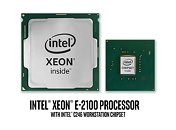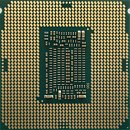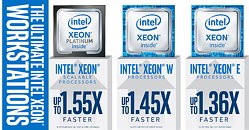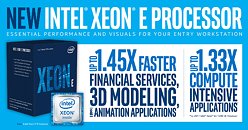- Joined
- Oct 9, 2007
- Messages
- 47,670 (7.43/day)
- Location
- Dublin, Ireland
| System Name | RBMK-1000 |
|---|---|
| Processor | AMD Ryzen 7 5700G |
| Motherboard | Gigabyte B550 AORUS Elite V2 |
| Cooling | DeepCool Gammax L240 V2 |
| Memory | 2x 16GB DDR4-3200 |
| Video Card(s) | Galax RTX 4070 Ti EX |
| Storage | Samsung 990 1TB |
| Display(s) | BenQ 1440p 60 Hz 27-inch |
| Case | Corsair Carbide 100R |
| Audio Device(s) | ASUS SupremeFX S1220A |
| Power Supply | Cooler Master MWE Gold 650W |
| Mouse | ASUS ROG Strix Impact |
| Keyboard | Gamdias Hermes E2 |
| Software | Windows 11 Pro |
Intel today announced the release of the new Intel Xeon E-2100 processor. The Intel Xeon E processor, successor to the Intel Xeon E3 processor, is designed for entry-level workstations that provide creators with powerful, single-threaded application performance with a platform optimized for reliability and affordability.
"With today's workloads, aging workstations impede productivity, collaboration and creativity. The release of the Intel Xeon E processor is intended to deliver the essential performance and visuals for entry workstations, as well as optimizing the innovative form factors, designs and diverse requirements of our customers," said Jennifer Huffstetler, vice president and general manager, data center product management, Intel Corporation.




The new Intel Xeon E processor delivers a powerful combination of performance and capabilities for entry-level workstations. They are architected and crafted for the demands of creative professionals. Compared with its predecessor, the new processor offers higher max turbo frequency, faster DRAM speeds, enhanced I/O, and advanced security and reliability features. These processors are available with Intel UHD graphics supported by a broad set of workstation application.
The Intel Xeon E-2100 processor is a 6-core processor targeted at entry-level workstations. The combination of two additional cores and higher single-core turbo frequency delivers increases in performance across workstation benchmarks as compared with previous 4-core entry workstation processors. The processor offers Error Correcting Code (ECC) memory, a key feature to maximize data integrity, to help improve system stability and to reduce the possibility of silent data corruption.
Workstations powered by Intel Xeon processors meet the highly diversified demands of creative professionals in fields such as architecture, engineering, media and entertainment, and financial services. The Intel Xeon E processor is the latest addition to Intel's portfolio of workstation-optimized processors, which also includes Intel Xeon Scalable processors (delivering breakthrough dual-socket performance for the most advanced workstation professionals), and Intel Xeon W processors (targeting mainstream workstations with a combination of performance, enhanced memory capabilities, and hardware-enhanced security and reliability features).
Features:
View at TechPowerUp Main Site
"With today's workloads, aging workstations impede productivity, collaboration and creativity. The release of the Intel Xeon E processor is intended to deliver the essential performance and visuals for entry workstations, as well as optimizing the innovative form factors, designs and diverse requirements of our customers," said Jennifer Huffstetler, vice president and general manager, data center product management, Intel Corporation.




The new Intel Xeon E processor delivers a powerful combination of performance and capabilities for entry-level workstations. They are architected and crafted for the demands of creative professionals. Compared with its predecessor, the new processor offers higher max turbo frequency, faster DRAM speeds, enhanced I/O, and advanced security and reliability features. These processors are available with Intel UHD graphics supported by a broad set of workstation application.
The Intel Xeon E-2100 processor is a 6-core processor targeted at entry-level workstations. The combination of two additional cores and higher single-core turbo frequency delivers increases in performance across workstation benchmarks as compared with previous 4-core entry workstation processors. The processor offers Error Correcting Code (ECC) memory, a key feature to maximize data integrity, to help improve system stability and to reduce the possibility of silent data corruption.
Workstations powered by Intel Xeon processors meet the highly diversified demands of creative professionals in fields such as architecture, engineering, media and entertainment, and financial services. The Intel Xeon E processor is the latest addition to Intel's portfolio of workstation-optimized processors, which also includes Intel Xeon Scalable processors (delivering breakthrough dual-socket performance for the most advanced workstation professionals), and Intel Xeon W processors (targeting mainstream workstations with a combination of performance, enhanced memory capabilities, and hardware-enhanced security and reliability features).
Features:
- Up to 6 cores and 12 threads
- Up to 4.70 GHz using Intel Turbo Boost Technology 2.0
- Up to 64 GB DDR4 ECC 2666 MHz
- Available with Intel UHD Graphics 630 supporting 4K UHD with built-in HEVC 10-bit hardware acceleration delivers enhanced 4K media decoding and encoding
- Up to 40 lanes of PCIe for graphics, storage and network expandability
- Support for USB 3.1 and Thunderbolt technology
- Support for Intel Optane memory for a faster, smoother and amazingly responsive computing experience
- Advanced hardware-enhanced security with Intel vPro technology and enhanced Intel Software Guard Extensions Support for Intel Ethernet and Intel Wireless-AC networking
View at TechPowerUp Main Site







